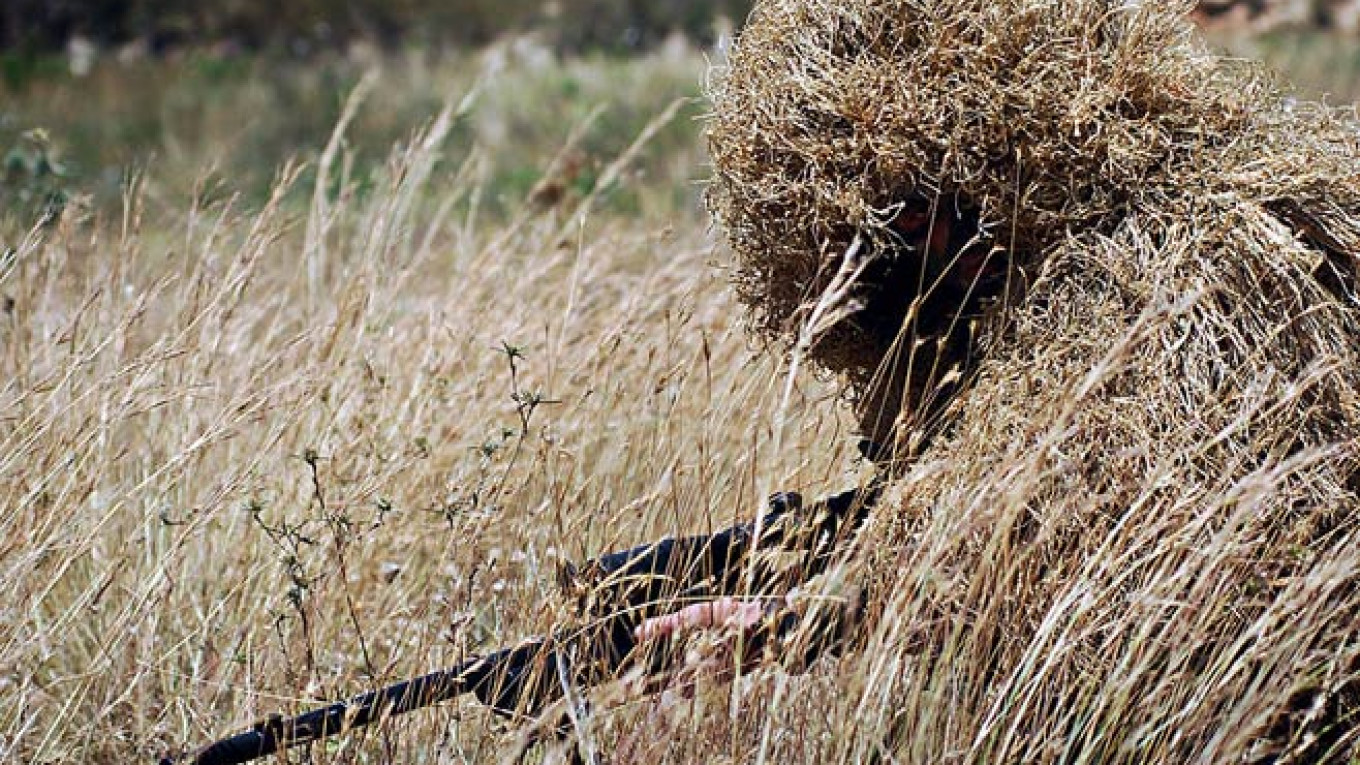Маскировка: camouflage, variously
Because I'm a news junkie, I read more about the Ukraine crisis than anyone who values their sanity. And because I read so much about Ukraine and am so interested in language, right now my main sources of new words are military terminology and obscenities. But at least the word family I've become obsessed with this week is not just used in the theater of war, but in the kitchen, gym, operating room — and the regular theater, too.
I'm thinking of маска (mask), маскировать (to mask), маскировка (something masked).
Маска is used in Russian pretty much the way mask is used in English. For example, in an example of shared holiday-making: Купил страшную маску «тыква-убийца» на Хэллоуин (He bought a scary mask of a killer pumpkin for Halloween). In "House M.D. " or «Доктор Хаус» doctors don маска for surgery and put маска over the patient's nose and mouth on the operating table.
Appearance-conscious women and men put питательную (nourishing), очищающую (cleansing), or освежающую маску (refreshing mask) on their faces before a night out on the town. And in both languages, маска/mask can be used to describe a person's false appearance, although in English this kind of mask is usually a facial expression while in Russian it can refer to more general behavior. Под маской лояльности он нас жутко подвёл (While pretending to be loyal, he really let us down).
Маскировать is the verb that describes donning a mask or the act of camouflage. In the kitchen, this kind of concealment is innocent: маскировать (to mask) means to cover prepared food with a layer of sauce or glaze. But elsewhere it can be nefarious. Продают синтетический мёд, маскируя под натуральный (They sell synthetic honey that they pass off as the real stuff). Or protective: Зелёная сетка маскировала от вражеских самолётов пушки, машины и ангары (Green netting camouflaged the guns, vehicles and hangers from the enemy planes).
Маскировка is an act of concealment that might be benign. It might be carried out in the garden: Вьющиеся растения подходят и для маскировки старых пней (Climbing plants are good for hiding old tree stumps). Or in front of the mirror: Визажисты советуют использовать более густой тон в тех случаях, когда необходима более эффективная маскировка недостатков кожи (Make-up artists advise using a thicker foundation when you need to effectively camouflage skin problems).
In the military, it can refer to camouflaging troops or equipment from enemy eyes. Нельзя нарушать один из основополагающих принципов маскировки: не иметь в своей одежде предметы, отражающие свет (You can't violate one of the main principles of camouflage: Don't wear anything reflective).
But маскировка has a broader military meaning: strategic, operational, physical and tactical deception. Apparently in U.S. military terminology, this is called either CC&D (camouflage, concealment and deception) or more recently D&D (denial and deception). It is the whole shebang — from guys in ski masks or uniforms with no insignia, to undercover activities, to hidden weapons transfers, to — well, starting a civil war but pretending that you've done nothing of the sort.
Way back in 1995, when the U.S. and Russia were so friendly that language columnist William Safire could come to Moscow and chat about terminology with the boys on Lubyanka, he fell under the spell of this Russian term. "What a beautiful word, pronounced mas-kir-OAF-ka," he wrote then.
Man, what a difference two decades make.
Michele A. Berdy, a Moscow-based translator and interpreter, is author of "The Russian Word's Worth" (Glas), a collection of her columns.
A Message from The Moscow Times:
Dear readers,
We are facing unprecedented challenges. Russia's Prosecutor General's Office has designated The Moscow Times as an "undesirable" organization, criminalizing our work and putting our staff at risk of prosecution. This follows our earlier unjust labeling as a "foreign agent."
These actions are direct attempts to silence independent journalism in Russia. The authorities claim our work "discredits the decisions of the Russian leadership." We see things differently: we strive to provide accurate, unbiased reporting on Russia.
We, the journalists of The Moscow Times, refuse to be silenced. But to continue our work, we need your help.
Your support, no matter how small, makes a world of difference. If you can, please support us monthly starting from just $2. It's quick to set up, and every contribution makes a significant impact.
By supporting The Moscow Times, you're defending open, independent journalism in the face of repression. Thank you for standing with us.
Remind me later.








